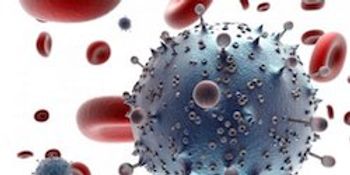
Among HIV-positive women with diabetes, HIV control has improved over time, but diabetes control has not.
Jaime is a freelance writer for The American Journal of Managed Care® (AJMC®), where she previously worked as an assistant editor.
She has a BA in print journalism from Penn State University. You can connect with Jaime on LinkedIn.

Among HIV-positive women with diabetes, HIV control has improved over time, but diabetes control has not.

During a session at the 2018 American Society of Clinical Oncology Annual Meeting, June 1-5, in Chicago, Illinois, panelists discussed the financial burdens of cancer diagnosis and treatment, the barriers facing clinicians and patients in discussing these financial burdens, and solutions that can be implemented to alleviate the burden.

As the opioid epidemic persists in the United States, there are growing questions and concerns over how to manage cancer-related pain and aberrant opioid use. During a session at the 2018 American Society of Clinical Oncology Annual Meeting, Egidio Del Fabbro, MD, Virginia Commonwealth University Massey Cancer Center, discussed several management strategies that can be used to address these concerns.

The estimate includes the average cost of healthcare paid by both employers and employees through insurance, deductibles, and out-of-pocket costs.

In the era of real-world data and its growing role in oncology, panelists discussed collecting and using this information in combination with clinical trials to inform evidence-based care during a session at the 2018 American Society of Clinical Oncology Annual Meeting.

While utilization management in general is a pain point for everyone, it’s a necessary evil in the United States, where we spend 18% of our gross domestic product on healthcare, explained Debra Patt, MD, MPH, MBA, vice president, policy and strategy, Texas Oncology; medical director, analytics, McKesson Specialty Health, during a session at the 2018 American Society of Clinical Oncology Annual Meeting in Chicago, Illinois.

Mortality rates have stabilized and incidence rates of late-stage disease have started to increase after 2 decades of decreasing rates. At the same time, rates of prostate-specific antigen screening have declined.

As this month marks the 15th anniversary, the US President’s Emergency Plan for AIDS Relief (PEPFAR) now supports over 14 million people globally with HIV treatment.

Pembrolizumab significantly improved overall survival (OS) and progression-free survival (PFS) as first-line treatment for squamous non–small cell lung cancer (NSCLC) in the pivotal phase 3 KEYNOTE-407 trial.

The HOPE in Action Multicenter Kidney Study will examine the safety of HIV-to-HIV kidney transplantation.

Working age migraineurs are more likely to experience painful musculoskeletal disorders, such as fibromyalgia and depression, than those without migraine.

Recognizing the impact housing status has on health, Kaiser Permanente announced an impact investment of $200 million and is teaming up with mayors and CEOs nationwide to reduce homelessness and housing instability.

Neurological damage begins early in infection, particularly during untreated infection, and worsens with the continued absence of combination antiretroviral therapy (cART). However, initiating cART may halt further deterioration, emphasizing the importance of early cART.

While cancer incidence rates have decreased among men, they've remained stable among women and have increased among children; however, there has been an overall decline in mortality rates among men, women, and children.

Rucaparib, the PARP inhibitor approved for the treatment of ovarian cancer, may have potential clinical benefit for patients with advanced pancreatic cancer and a BRCA1/2 mutation.

The FDA has warned of serious cases of neural tube birth defects involving the brain, spine, and spinal cord affecting babies born to women with HIV being treated with dolutegravir.

The FDA has approved an expanded indication for Gilead Science’s emtricitabine/tenofovir disoproxil fumarate (Truvada) to reduce the risk of HIV in at-risk adolescents. Truvada for pre-exposure prophylaxis (PrEP) was first approved for the use in adults in 2012.

The FDA has approved Amgen and Novartis’ erenumab-aooe, marking the first approved calcitonin gene-related peptide (CGRP) inhibitor for the prevention of migraine in adults. The treatment will cost 30% less than expected.

The number of Medicare Part D enrollees reaching catastrophic coverage increased by more than 50% from 2013 to 2016, according to an analysis form Avalere Health

CMS has approved a 5-year extension of Maryland’s all-payer model, expanding the approach across the health system starting January 1, 2019.

While immune checkpoint inhibitors significantly improve overall survival in both sexes, the magnitude of benefit is dependent on sex, according to new study findings.

Chronic migraine is associated with pain, psychiatric, and endocrine/neurological comorbidities, as well as sleep disorders.

The FDA has drafted new recommendations on the development of drugs to treat pediatric patients with HIV meant to be applied on a global scale.

A group of healthcare organizations have come together to advocate for policies that support independent practices moving to risk-based care models.

The FDA has approved Pfizer’s epoetin alfa-epbx (Retacrit), a biosimilar to epoetin alfa (Epogen), marking the first biosimilar approval of 2018 and the first biosimilar erythropoiesis-stimulating agent approved in the United States.

In the 4 months following their approvals, pembrolizumab and nivolumab reached more than 60% of eligible patients with melanoma, non-small cell lung cancer, and renal cell carcinoma.

Through an HIV heatmap, as well as an extensive survey and customized web-based software to connect social determinants with viral suppression rates, an HIV primary care program is working to reduce the number of new HIV diagnoses and increase viral suppression rates in Long Island and Queens.

A month after the Surgeon General issued an advisory calling for more people to carry naloxone, a Health Affairs blog post underscored the complexity of identifying who is most likely to benefit, as well as ensuring accessibility and affordability.

The Institute for Patient Access has issued a response to the Institute for Clinical and Economic Review (ICER) following its report assessing the clinical effectiveness and economic value of calcitonin gene-related peptide (CGRP) inhibitors for the treatment of chronic or episodic migraines.

The US Preventive Services Task Force (USPSTF) recommends that men aged 55 to 69 make their own decision on whether or not to be screened periodically for prostate cancer after they have had a conversation with their physician on potential benefits and harms.

259 Prospect Plains Rd, Bldg H
Cranbury, NJ 08512
© 2025 MJH Life Sciences®
All rights reserved.
